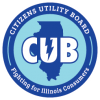Welcome to the Big Energy Data Center
Thanks to the efforts of Environmental Defense Fund (EDF), the Citizens Utility Board (CUB), and the Illinois Commerce Commission (ICC), researchers now have access to a trove of anonymous energy-usage data representing millions of electric customers in Illinois. This data empowers groundbreaking research to help save customers money, unlock energy-saving innovation, and answer policy questions vital to our pocketbooks and the planet. (Read EDF’s fact sheet on the power of big data.)
The Big Energy Data Center features new research to benefit consumers.
New Research
Better Heat: The Economics of Residential Building Electrification in the City of Chicago: This analysis focuses on electric “heat pumps,” an ever-improving technology that can cool and heat homes. CUB’s research team found that homeowners who switch from natural gas to a heat pump would enjoy lifetime savings ranging from $24,716 to $47,104. In total that could potentially generate between $25.3 billion and $28.9 billion in cumulative savings for Chicago residents over the next 34 years. (Read CUB’s news release.)
The Impact of Climate Change on Future ComEd Electricity Demand and Costs: New Evidence from Advanced Metering Infrastructure Data. Using anonymous electricity usage data captured by Advanced Metering Infrastructure (AMI), this analysis shows that by 2050 higher cooling needs in warmer summers will lead customers of Illinois’ largest electric utility to use 3.9 TWh more electricity than in the base case scenario. Cumulatively, under conservative price projections, customers would pay an additional $10.9 billion (in 2018 dollars) over this period. Climate change will hit residential electric bills hardest: the average cost increase for residential customers would be 7.7 percent.
Using electricity customer profiles to combat GHG emissions: New evidence from ComEd AMI data. This first-of-its kind study categorizes the residential customer base of Illinois’ largest electric utility, Commonwealth Edison, into slices of customer-usage profiles to determine their marginal Greenhouse Gas emissions for the period 2016− 2018. This paper, published in The Electricity Journal, found behavioral changes by electricity customers could have the equivalent benefit of taking 160,000 cars off the road.
Past Research
EV for All: Electrifying Transportation in Low-Income Communities (Vol. 3 in the ABCs of EVs series). With the right electric vehicle (EV) policies, Illinois can deliver cleaner air, low-cost transportation options and lower energy costs for all consumers, particularly in neighborhoods most burdened by pollution, poverty and high power bills. (Read CUB’s news release.)
Charge for Less: An Analysis of Electricity Pricing for Electric Vehicles in Ameren Territory. We compare what customers of utility Ameren Illinois would have paid in 2018 to charge their electric vehicles under average rates compared to the utility’s Power Smart Pricing hourly electricity rates. We find that EV drivers on hourly pricing would save 50-51% on their energy costs. (Read CUB’s news release, and learn more about Power Smart Pricing.)
Six unique load shapes: A segmentation analysis of Illinois residential electricity consumers This clustering analysis of 2.5 million Illinois electric customers highlights the potential for making significant cost reductions for the power grid through targeted demand-response programs, and illustrates the potential of unfair cross-subsidization in common electric rate designs.
Charging Ahead: Deriving Value from Electric Vehicles for All Electricity Customers (Vol. 2 in the ABCs of EVs Series): We find that well-managed, or optimized, electric vehicle charging could produce up to $2.6 billion in cumulative consumer savings in Illinois through 2030. (Read a Summary of the analysis. Read CUB’s news release.)
The ABCs of EVs: A Guide for Policy Makers and Consumer Advocates (Vol. 1 in the ABCs of EVs Series)
Charge for Less: An Analysis of Hourly Electricity Pricing for Electric Vehicles: We compare what customers of Illinois utility Commonwealth Edison would have paid in 2016 and 2017 to charge their electric vehicle under average rates compared to the utility’s hourly pricing program, and find that EV drivers on hourly pricing would save 52-59% on their energy costs.
Modelling Marginal System Costs for the Commonwealth Edison Distribution Network: The installation of Advanced Metering Infrastructure (AMI) across the Commonwealth Edison distribution system provides renewed potential for big data analytics to characterize the interaction between consumer loads and the utility’s system-wide costs. In this paper, we investigate different consumers’ marginal system cost impacts as a result of their load profiles.
Big Energy Data-UPDATE: In our last review of 2016 smart meter data, we found that 97% of electricity customers in our sample would have saved money with an hourly pricing program. In this new research we find that low-income households in Northern Illinois used significantly less electricity on average in 2016. This shows how higher fixed charges on power bills not only discourage efficiency but also hit poor communities hardest.
The Costs and Benefits of Real-Time Pricing: An empirical investigation into consumer bills using hourly energy data and prices. (Read the summary of the analysis. Read CUB’s news release.)
Illinois’ Big Data Story
A series of major policy changes in recent years has positioned Illinois to become a hub for ground-breaking energy research. Here’s the story:
- October, 2011: The Illinois General Assembly passes the Energy Infrastructure Modernization Act, which opens the door for Commonwealth Edison (ComEd) and Ameren Illinois to install digital advanced meters (smart meters) in about 4 million homes throughout Illinois. These meters have the ability to accurately record more energy-usage data than ever before.
- January, 2012: The Green Button Initiative is launched. A cooperative effort among utilities (including ComEd and Ameren) and technology companies, the Green Button Initiative allows customers to view their energy-usage data and voluntarily share it with third-party services to take advantage of services that can help people become more energy efficient.
- December, 2016: The Illinois General Assembly passes the Future Energy Jobs Act, which will boost energy efficiency programs to record levels and save consumers billions of dollars on their electric bills. The act underlines the importance of Illinois developing policy that will protect privacy and support a free flow of energy data that can spark energy efficiency innovations.
- February, 2017: The ICC approves an energy data-sharing program for ComEd. The program, developed by EDF and CUB, allows companies and researchers access to anonymous energy-use data from ComEd smart meters.
- July, 2017: The ICC (ICC) finalizes the “Open Data Access Framework,” developed by EDF and CUB to cut pollution and help customers save energy and money. The framework is made up of guidelines for securely authorizing and sharing energy-use data.
- November, 2017: BigEnergyData.info is launched.

Environmental Defense Fund (edf.org), a leading international nonprofit organization, creates transformational solutions to the most serious environmental problems. EDF links science, economics, law, and innovative private-sector partnerships. Connect with us on Twitter, Facebook, and our Energy Exchange blog.

The Citizens Utility Board is Illinois’ leading nonprofit utility watchdog. Created by the Illinois Legislature, CUB has saved consumers more than $20 billion since 1984 by helping to block rate hikes and secure refunds. For more information, call CUB’s Consumer Hotline, 1-800-669-5556, or visit its award-winning website, www.CitizensUtilityBoard.org.

